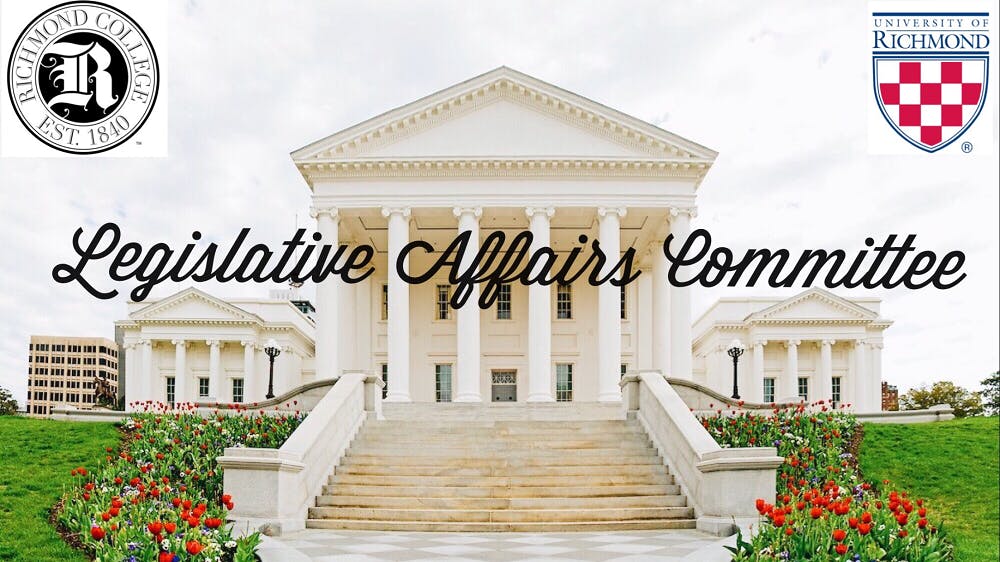The Richmond College Student Government Association has enacted a new standing committee to help connect Richmond students with government officials.
This new Legislative Affairs Committee will work to advocate for the student body in different levels of government, as well as to encourage greater student participation in legislative happenings, said Adam Gibson, a junior RCSGA senator and chairman of the new committee.
“We wouldn’t be exercising our full potential for advocating for the students we represent if we didn’t voice their concerns within those government bodies,” Gibson said.
The RCSGA will vote on whether or not to include the committee into the Senate’s constitution in March. If voted in, the new committee would be the first addition to the original five committees in RCSGA’s history. For now, the committee is a standing committee, but Gibson said he is excited for other senators to join and help the initiative in hopes of adding it permanently to the Senate.
This committee would stick to a strict non-partisan, representative ideology so that student voices would be heard, and so the committee could better connect to the school, Gibson said. This idea is grounded in the Legislative Affairs Committee section of the RCSGA constitution, if passed in March.
“Instances of direct political advocacy must be grounded in student concern and must further the RCSGA’s mission to create the highest quality of life for the students of Richmond College and the University of Richmond,” according to the section.
Gibson said this is of utmost importance. A student must contact the Senate, whether by attending a meeting or a Town Hall Forum, about issues in higher education before the senators can seek out lawmakers regarding specific issues. He also would like to see an increase in student turnout at these meetings where legislation is being discussed, he said.
Once senators have been placed on the new committee, Gibson said he plans to start contacting legislators. This semester the committee will focus on adding a student perspective to the conversations around bills that will be introduced to the Virginia General Assembly next spring.
Campus Police Chief Dave McCoy said this is a perfect opportunity for students to work with legislators, especially given Richmond’s proximity to them. Students would be able to share their views rather than just receiving rulings.
Issues in higher education are always being discussed by state lawmakers, McCoy said. Last year, given the national attention to the sexual assault allegations at the University of Virginia, sexual assault on college campuses was a prominent topic in the General Assembly.
Though that was a hot topic last session, it could be something entirely new this year. Student input is valued by legislators and offers an important perspective on issues, especially related to higher education. This committee could also bolster student engagement in this policy-making, McCoy said.
The Senate should start building relationships with representatives now, McCoy said. Richmond has a great reputation in the General Assembly as many alumni serve. Legislative luncheons hosted by the university would be a way to meet these representatives and begin fostering discussions before the busy session begins, he said.
Enjoy what you're reading?
Signup for our newsletter
The university will try to help with transportation down to assembly meetings and hearings, but there is not a definitive plan yet, McCoy said.
Gibson said he was surprised that, given Richmond’s proximity to the General Assembly, there had never been any body that advocated for Richmond students to legislators. He contacted similar student government groups at other schools about working together in the future, including a similar committee at U. Va.
U. Va. has a Legislative Affairs Committee in their student council. U. Va. junior Katherine Brandon is a co-chairwoman on the committee. Students are strongly politically inclined so it is important to represent their views in political discussions, she said.
Members of U. Va.’s committee take day trips to Richmond during the session to lobby for student views, Brandon said. The committee also coordinates a yearly “UVA Day” when committee members meet with state delegates and senators to help build relationships between lawmakers and U. Va., as well as offer a student perspective.
It is important to have a partnership between public and private universities, though some state laws may have a larger effect on U. Va. as it is publicly funded, Brandon said. She thinks of Richmond as one of U. Va.’s closest peer institutions and said it will be beneficial to have more of a student perspective for the General Assembly. With the committee just starting up, there are no concrete plans yet for a partnership between U. Va.’s and Richmond’s committees.
Ultimately, a college campus is unlike any other environment as it is not quite the real world, so the laws that primarily affect this select population need the insight from those who actually live in and understand this particular arena, Gibson said.
“I think that we’re going to see young people our age getting more involved in the political process just on their own,” Gibson said. “I think this is a great way to set that example so that the people who are running our society are more interested in the issues that affect [students] directly.”
Editors Note: Adam Gibson is The Collegian's managing operating editor
Contact reporter Ellie Potter at elizabeth.potter @richmond.edu.
Support independent student media
You can make a tax-deductible donation by clicking the button below, which takes you to our secure PayPal account. The page is set up to receive contributions in whatever amount you designate. We look forward to using the money we raise to further our mission of providing honest and accurate information to students, faculty, staff, alumni and others in the general public.
Donate Now



